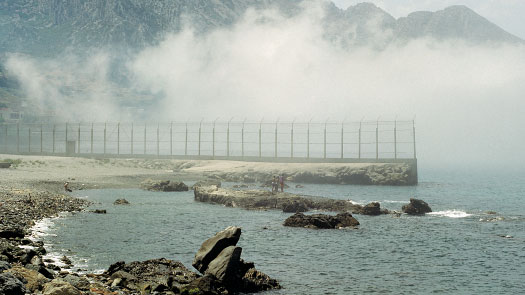Friday 20 November 2015
Art and Geopolitical Borders
Contested sovereignty and art practice
Full price £15 / Concessions £5.
In recent years there has been a growth in interest in the ways that art practice can both acknowledge and articulate the issues around geopolitical borders. This has become significantly more pressing in the light of developments during the last few months, whereby borders, and the complex situation of the multitude of people crossing borders, have become increasingly visible as urgent political issues. Borders have long functioned as a vital component of state-formation and nation building, a role that continues within the shifting politics of globalisation. We have seen recently that their significance is thus subject to ongoing redefinition through a dynamic between a repressive politics of containment and attempts to challenge this. Within these zones of contestation, relationships between geographies and power become both clearly visible and subject to dispute. And although this functions on one level in terms of collective experience, the effects on individuals are also destructive and traumatic.
Recently there has been an upsurge in art practices that visualise the tensions and contradictions arising from contemporary borders. However art can also function as a means of disruption and intervention within the established operations and normative meanings of border technologies, and as a site of reparation, where traumatic histories can be negotiated in turn. This one day symposium attempts to address these and related issues.
Programme
Download Abstracts & Speaker Profiles
9.00 – 9.30
Registration
9.30 – 9.45
Introduction: Beccy Kennedy
Welcome: Penny Macbeth, Head of Department of Art, Manchester School of Art
9.45 – 11.15
Session One: Limits to British Sovereignty
Chair: Fionna Barber
- Ann Carragher, Blackpool School of Creative Arts: “Landscape, Liminality and Lament” Paul Jones, Glyndwr University, Wrexham: “Croeso I Gymru /Welcome to England – Performing the Welsh/English Border”
- Venda Louise Pollock and Alexia Mellor, University of Newcastle: “The Debatable Lands: Artists interrogating borders”
11.15 – 11.45
COFFEE
11.45 – 1.00
Session Two: People, Borders, Crossings
Chair: Simon Faulkner
- James Ellison, Loughborough University: “The Calais border in visual culture: trauma, resistance, and technology”
- Gavin MacDonald, Manchester School of Art: “Trace and testimony: mapping the migrant body in the work of Bouchra Khalili and Pedro Lasch”
- Amanda Crawley Jackson, University of Sheffield: “A ‘Solid Sea’? Mediterranean Crossings in the Age of Globalisation”
1.00 – 2.00
LUNCH (to be provided)
2.00 – 3.30
Session Three: Artists’ Projects: Asylum and Europe
Chair: Beccy Kennedy
- Claudia Bernardi and Paulo Do, Studio Roma – ISR: “Lines of Shadow”
- Sarah Mekdjian and Anne-Laure Amilhat Szary, Université Grenoble-Alpes, “Crossing Maps : a counter-mapping project between art and sciences of contemporary border-crossings”
- Anthony Haughey, Dublin Institute of Technology: “Waiting for News From Home: Negotiating citizenship in ‘Fortress Europe”
3.30 – 4.00
TEA
4.00 – 5.30
Session Four: Gendering the Border
Chair: Fionna Barber
- Francisca Sanchez-Ortiz, Manchester Metropolitan University: “Art and /in Border Violence”
- Suzanna Chan, University of Ulster: “Aesthetics of Hospitality and Sexual Difference: Chantal Akerman’s De L’Autre Côté/From the Other Side”
- Alice Correia, University of Salford: “Remembering Partition in South-Asian diaspora art”
5.30 – 6.00
Concluding Discussion
Chair: Simon Faulkner
6.00 – 6.30
Wine Reception
All papers are 20 minutes in length with 30 minutes discussion at the end of each session.
